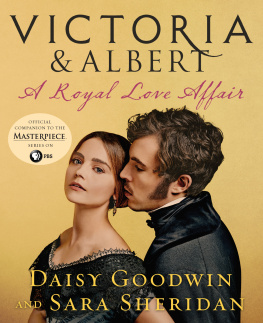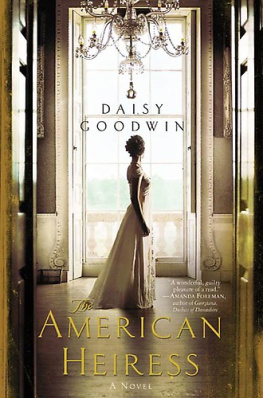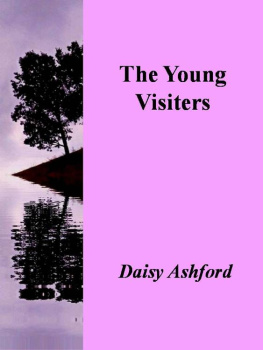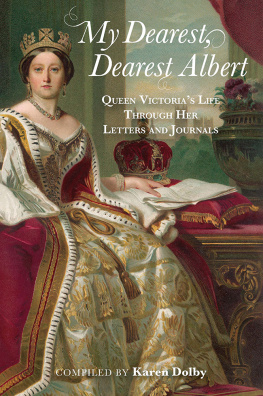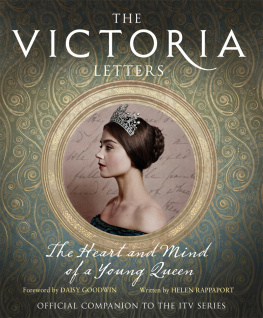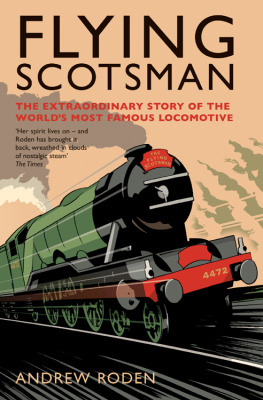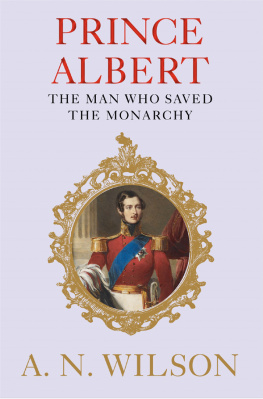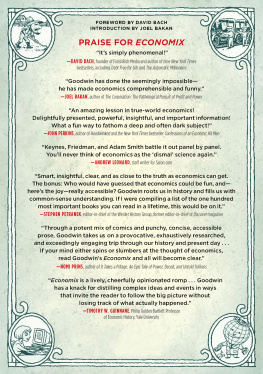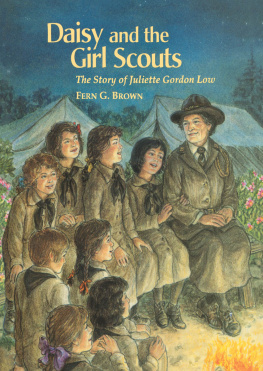Daisy Goodwin - Victoria & Albert
Here you can read online Daisy Goodwin - Victoria & Albert full text of the book (entire story) in english for free. Download pdf and epub, get meaning, cover and reviews about this ebook. year: 2017, publisher: St. Martins Publishing Group, genre: Non-fiction. Description of the work, (preface) as well as reviews are available. Best literature library LitArk.com created for fans of good reading and offers a wide selection of genres:
Romance novel
Science fiction
Adventure
Detective
Science
History
Home and family
Prose
Art
Politics
Computer
Non-fiction
Religion
Business
Children
Humor
Choose a favorite category and find really read worthwhile books. Enjoy immersion in the world of imagination, feel the emotions of the characters or learn something new for yourself, make an fascinating discovery.
- Book:Victoria & Albert
- Author:
- Publisher:St. Martins Publishing Group
- Genre:
- Year:2017
- Rating:5 / 5
- Favourites:Add to favourites
- Your mark:
- 100
- 1
- 2
- 3
- 4
- 5
Victoria & Albert: summary, description and annotation
We offer to read an annotation, description, summary or preface (depends on what the author of the book "Victoria & Albert" wrote himself). If you haven't found the necessary information about the book — write in the comments, we will try to find it.
Victoria & Albert — read online for free the complete book (whole text) full work
Below is the text of the book, divided by pages. System saving the place of the last page read, allows you to conveniently read the book "Victoria & Albert" online for free, without having to search again every time where you left off. Put a bookmark, and you can go to the page where you finished reading at any time.
Font size:
Interval:
Bookmark:


& ALBERT
WITH DAISY GOODWIN
ST. MARTINS PRESS
NEW YORK
The author and publisher have provided this e-book to you for your personal use only. You may not make this e-book publicly available in any way. Copyright infringement is against the law. If you believe the copy of this e-book you are reading infringes on the authors copyright, please notify the publisher at: http://us.macmillanusa.com/piracy.

I T COULD HAVE been a disaster. First cousins catapulted into a match that suited the dynastic ambitions of their relatives. A pair who seemed to have nothing in common: he was a highbrow who had studied science and philosophy; she liked dancing and watching lion tamers. He got up early and ate very frugally; she liked to sleep in and loved tucking into a plate of lamb chops. All they had in common was their liking for dogs (he had a greyhound called Eos; she, of course, had Dash, her Cavalier King Charles spaniel), music oh, and an overwhelming physical attraction for each other.
You only have to read Victorias diaries during their courtship to know that this is no marriage of convenience but a throbbingly passionate love match. She writes about Albert in his white cashmere breeches with nothing underneath; he writes about how his whole soul longs for Victoria. This was a pair who couldnt keep their hands off each other, as their nine children in seventeen years testifies. One of my favourite facts about Albert is that he came up with a special gadget that meant he could lock their door without getting out of bed, which was handy if you had a palace full of servants and children. But Victoria and Alberts marriage was passionate in every sense. They were the Elizabeth Taylor and Richard Burton of the nineteenth century two huge personalities who were locked in a battle for mastery over the other. They fought fiercely, with stand-up rows that raged all over the palace, and then they made up with equal passion. Their rows were over things that many modern couples can relate to: the upbringing of their children, the amount of time they spent away from each other, the inequality between them when it came to status as Albert wrote sadly to one of his friends, I am the husband but not the master in the house.

However, unlike some modern mismatched royal couples we could mention, Victoria and Albert were able to accommodate this, allowing Albert to make a significant contribution to his adopted country, while still supporting his wife. After his death at the age of forty-two, Victoria wrote that Albert did everything for her, even chose her bonnets, but I think she was trying in retrospect to portray herself as the kind of perfect submissive Victorian wife that she most definitely wasnt. One of the things that makes Victoria such an attractive subject for a modern writer and audience is that no one ever puts her in a corner. She may have liked to present herself as a little woman and she was undoubtedly small but she never, ever went under. The pictures of the couple always have Victoria gazing adoringly up at her husband, but that was definitely her way of redressing the imbalance in their relationship. As I have Victoria say in a scene in the first episode of series two, when Albert is dressed up in his Hussars uniform, ready to inspect his regiment, It may be your regiment, Albert, but it is my army.
Despite the dramatic nature of their fights (the hairbrush-throwing incident in the series and the time when Albert refuses to come back from a dinner are both based on real events), Victoria and Albert were brilliant at keeping their domestic squabbles out of the public eye. After a succession of fat old kings with frumpy German wives, the young Victoria, her handsome prince and their ever-growing brood of adorable children were an image that gladdened the nations heart or at least the part of the nation that wasnt complaining about how much all this domestic bliss was costing. In the 1840s the royal family became, for the first time, not just a symbol of power, but also a role model. Everybody wanted to play happy families like the royal couple, who unlike their predecessors did not have lovers or indulge in gambling or other decadent pursuits. Victoria and Albert may have given each other lavish presents in private, but in public they seemed like an ordinary bourgeois couple, just with better clothes. Their genius as a couple was not just to have one of the most successful royal marriages ever, but to reinvent the British monarchy as a cosy incarnation of domestic bliss that everyone could aspire to. Inside the palace their fights may have been rocket-fuelled, but in the public gaze they were a model of serenity.


Their success at projecting themselves as the perfect couple has meant that the real drama behind Victoria and Alberts marriage has been largely forgotten, an oversight which I hope to put right in the series and in this book. Its important to know how hard they had to work on their marriage as the problems they faced were those that will resonate with many people today, even if they did have a lot more money and help and much better jewellery. Victoria and Albert inspired a nation in the nineteenth century. They can still inspire us today.
~DAISY GOODWIN, SCREENWRITER OF VICTORIA

The great joy for me about writing Victoria is that I am never lost for inspiration. The place I start is always the diaries, not so much for a factual record of her life, but to get that unmistakable tone of voice observant, emphatic, passionate. In the diaries and letters that are in Victorias own hand (most of the diaries were transcribed after her death by her younger daughter, Beatrice), you can actually see her state of mind the pages are full of CAPITAL LETTERS and emphatic underlining, and after Alberts death you can see the grief in her letters in the way that her usually beautiful script degenerates into an inchoate scrawl.
But while I am inspired by the diaries, they are not Holy Writ; indeed, they are only reliable as an indication of Victorias state of mind, and sometimes not even that, as her diaries were only semi-private in the early years they were read by both her mother and Baroness Lehzen, and I am sure that Albert might have glanced through them during their marriage, too. She doesnt, for example, ever write about her rows with Albert, even though we know from contemporary accounts that their relationship was not a bed of roses. A woman who habitually describes her husband as an angel is to my mind protesting a little too much. My guess is that after a particularly stormy row with Albert, Victoria would assuage her guilt by writing about him in particularly glowing terms. Her diaries are rather like the carefully staged portraits of the royal couple in which Albert sits down casually while Victoria stands beside him, all wifely attention. The truth of the matter is that no one, not even Albert, could sit in the Queens presence without her permission, so there is nothing natural about his pose.
Font size:
Interval:
Bookmark:
Similar books «Victoria & Albert»
Look at similar books to Victoria & Albert. We have selected literature similar in name and meaning in the hope of providing readers with more options to find new, interesting, not yet read works.
Discussion, reviews of the book Victoria & Albert and just readers' own opinions. Leave your comments, write what you think about the work, its meaning or the main characters. Specify what exactly you liked and what you didn't like, and why you think so.

